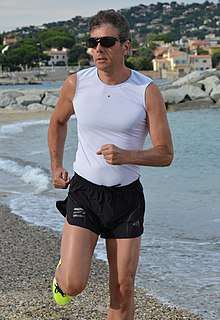Nicola Pfund
Nicola Pfund (born November 7, 1960 in Sorengo) is a Swiss Italian writer, blogger and journalist.

Biography
He is a native of Canton Schaffhausen, but he was born in Sorengo (Canton Ticino). After studying at a teacher-training college, Pfund got a diploma as librarian-documentalist and later as General Culture teacher. Currently he teaches at a vocational school and he writes for some newspapers as a sports journalist[1] (member sportpress.ch and AIPS). He is the author of several books[2] in the historical, educational, sports and travel fields. In particular, his tales about cycling trips in Switzerland[3][4] and over the Alpine passes[5][6] are well known and they sometimes offer new and original information about the country.
In 2012, he created a sports blog (triathlon, ecology and ethics in sports) that rapidly became one of the most visited in the Italian language area. Pfund was selected among the seven biggest bloggers of Switzerland involved in a new project of the blogosphere,[7] for the circulation of information concerning the "Energy Strategy 2050" of Switzerland.[8][9]
Bibliography
- Triathleta per passione: viaggio alla scoperta di uno sport affascinante, Lugano, Fontana, 2003.
- Breganzona: echi dalla collina di ponente, Lugano, Fontana, 2005.
- L'ABC del perfetto ricercatore, Lugano, Fontana, 2007.
- La Svizzera in bicicletta, Lugano, Fontana, 2008.
- Fare ricerca a scuola: notizie utili per svolgere piccole o grandi ricerche a scuola, Lugano, GLIMI, 2010.
- Sui passi in bicicletta – Swiss Alpine passes by bicycle, Lugano, Fontana, 2012.
- La filosofia del Jogger,[10][11] Bellinzona, Salvioni, 2012.
- A-Z fitness: sport, benessere, salute, Lugano, Fontana Edizioni, 2014.
- Allenare il corpo, allenare la mente, Firenze, Giunti Editore, 2015.
References
- Cfr. Aa. Vv., Il giornalismo sportivo nella Svizzera italiana, ATGS, Lugano 2009, p. 156-158.
- Pfund Nicola
- Tessiner Zeitung: Die Schweiz mit dem Fahrrad erkunden
- http://www4.ti.ch/fileadmin/DECS/DS/Rivista_scuola_ticinese/ST_n.311/ST_311_Sui_passi_in_bicicletta.pdf
- Corriere del Ticino
- UVEK – Treffen mit Bloggerinnen und Bloggern aus der ganzen Schweiz – #e2050
- Triathlon, che passione!: Doris Leuthard incontra i bloggers
- leumund.ch: energie politik
- http://www.triathlonmania.it/triathlon/la-filosofia-del-jogger-il-nuovo-libro-di-nicola-pfund/